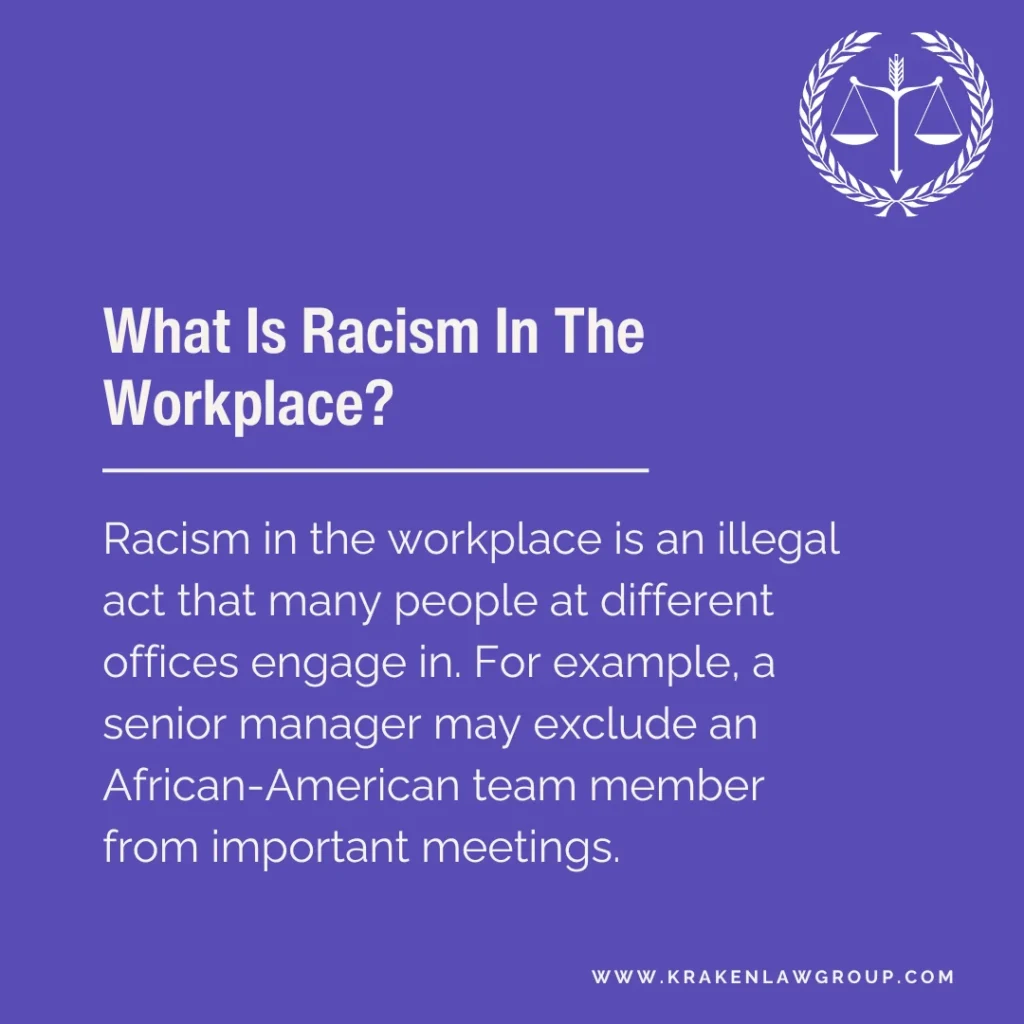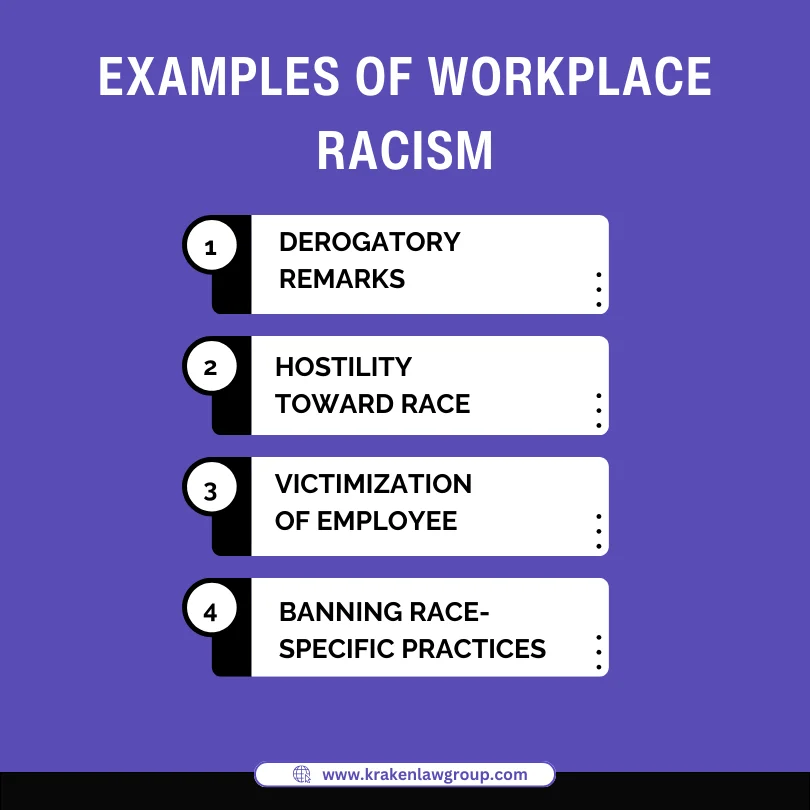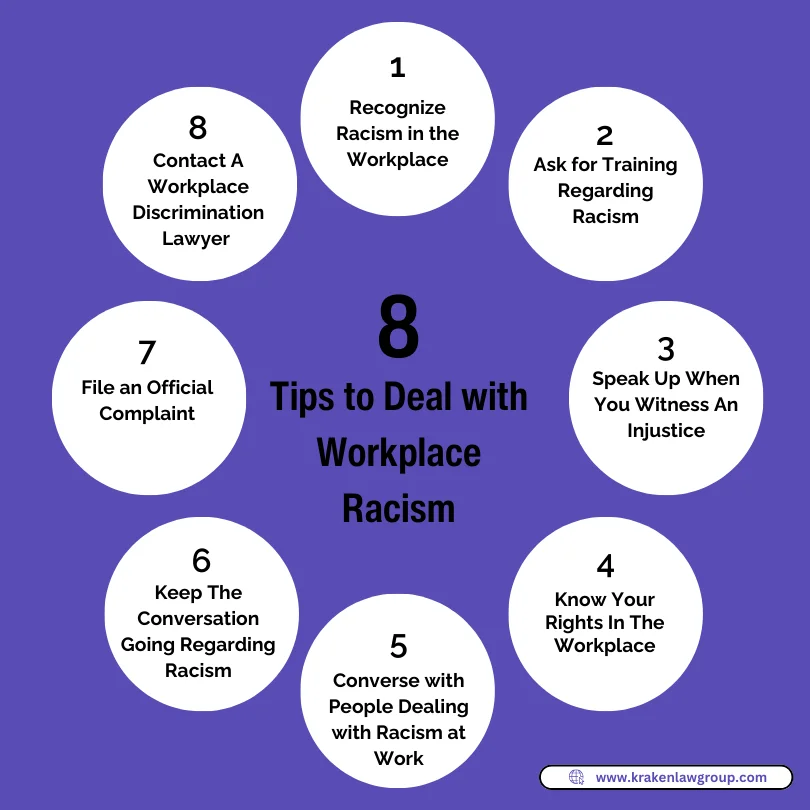More than 65% of people in the US believe racist views have become more common in American society. The worst part is that many people believe racism to be acceptable.
You may experience racism in your daily life at grocery stores while running errands or passing a police checkpoint on roads. One of the common places where people suffer from racism is offices.
Racism in the workplace is an important issue that is still persistent in society. If you want to learn more about it, you’re in the right place.
Let’s dive into the specifics of how to deal with racism in the workplace.
What Is Racism In The Workplace?

Racism in the workplace is an illegal act that many people at different offices engage in. For example, a senior manager may exclude an African-American team member from important meetings.
They may differentiate between workers using their race. Many people give white employees preferential treatment at their workplaces. Meanwhile, people of other races are put at a disadvantage in different ways such as:
- Denial of promotions
- Lower salaries
- Infrequent bonuses
- Wrongful termination
- Marginalized treatment
Examples Of Workplace Racism

There are many examples of racism in the workplace to help you understand this injustice such as:
- Direct discrimination may include comments such as “People like you don’t fit in this company role” or other derogatory remarks
- Indirect racial discrimination may include bans on specific hairstyles or dresses common within a specific race
- Racial harassment examples include a hostile workplace environment
- Victimization of an employee after a complaint against workplace racism
How To Deal With Racism In The Workplace: 8 Practical Tips

Below are the top eight tips to help you deal with racism in the workplace:
1. The First Step Is To Recognize Racism Happening In The Workplace
Before you can start to fight racism in your workplace, you must be aware of the issue in the first place. Many people experience employment racism but don’t realize it until someone tells them of clear signs.
This is why you must know how to recognize racism in the workplace. Remember insulting comments such as “you’re not our type for a specific project” are a common indicator of workplace racism.
If you’re not allowed to meet a specific client due to petty excuses, you can understand racism is happening. This is especially true if you’re the main point of contact for clients, but your company sends only white employees to meet a specific customer.
Other signs of racism include denial of promotion, while another person of a different race with lower performance in the same role is being promoted. Elimination of positions in a company due to race is also a clear indicator of injustice.
Your company may terminate you by saying your position is no longer needed in the office. However, sometime later they may create a different position with the same responsibilities and give it to an employee of another race.
2. Talk To Your Employer About Having Training Regarding Racism
Once you know racism in the workplace is common at your office, you can bring the issue to notice. Talking to your employer about training other workers regarding racism may help you deal with the issue subtly.
For example, you may recommend to your sympathetic senior manager to hold a session against racism. Such events at the company can help spread awareness about workplace racism.
A survey may also be conducted to understand whether racism in the workplace is happening at your company. For example, the survey may ask staff to mention what they have done to address racism. It may also include questions about the employer’s measures against racism in the workplace.
If staff members cannot answer these questions, it is an indicator of racism in the workplace. The company can then take active measures to start training their employees against this injustice.
All members of the company including CEOs should be required to attend training sessions to reduce racism in the company. You may also talk to your employer about introducing new policies against different forms of discrimination in the workplace.
3. Speak Up When You Witness An Injustice
Many people at their workplaces see discrimination examples around them but never raise their voices. Whether you are directly a victim of workplace racism or not, you must speak up whenever you observe an injustice.
If a colleague is insulting another colleague due to their race, you must intervene and let them know that they’re doing wrong. You may also use your knowledge of laws around racism in the workplace to inform the racist of the consequences.
A good way to learn about laws regarding racism in the workplace is by consulting a lawyer. Once you speak up about an injustice, it may be effective because the racist worker may fear that they may lose their job.
Some colleagues also avoid engaging in racism once they know that someone is speaking against the injustice. This is why, you must never ignore when you see someone suffering at your workplace due to racism.
The best thing about raising your voice is that it may also encourage others to speak up against employment racism. So your behavior may bring about a positive change in your company.
When a lot of people raise their voices at a company together, it can also enable the company supervisor to take strict action against racist workers.
4. Know Your Rights In The Workplace
Every company has specific policies to protect the rights of their workers. You must know the rules at your workplace to understand the actions you can take to deal with racism in the workplace.
Firstly, you must remember that every state in the US protects people from racism through various laws. For example, the Florida Civil Rights Act prohibits discrimination on age, gender, race, and other factors.
If anyone is found guilty of illegal discrimination, they may suffer a heavy fine or imprisonment.
One of your workplace rights will include the right to file a complaint. Any employee of a company can complain about an injustice by submitting an official document or oral evidence to their workplace HR.
The specific department will then investigate the complaint and help you get justice. They may also help you get rid of injustices such as denial of promotions or leaves due to racial discrimination.
Remember you also have a right to file a complaint with the government about racism in the workplace. Another way to know your rights at a workplace is by consulting a lawyer.
A workplace discrimination attorney can help you understand the laws around racism and your rights as an employee at a company.
5. Listen To Your Peers Who May Be Dealing With Workplace Racism
Another way to deal with racism in the workplace is by conversing with other people in your company. Your peers may be dealing with racism at the office for some time. So they may help you by offering you tips on how to deal with racism.
This is especially true if you’re a junior or a new employee at the company. Your peers may support you in different ways such as speaking up for you, helping you get out of tough situations, and encouraging you to file a complaint.
They may also offer you tips such as recording conversations when you’re with an employee who passes insulting remarks due to your race. You may even record videos when another worker is discriminating against your friend or colleague at the same company.
Your peers may also inform you of the names of different workers who engage in racism frequently at the company. This may help you avoid becoming a target of a specific group of colleagues at your workplace.
The best thing about discussing racism with your peers is that it can also allow you to talk to someone. This is especially true if you don’t want your family members to know about your suffering.
Support from your peers may save you from mental exhaustion and help you gather the strength to fight against workplace racism.
6. Keep The Conversation Going Regarding Racism
Continuing the conversation about workplace racism at your company is necessary if you want to bring change. That is because it will indicate to supervisors that you and your peers will not let go of the matter.
Such active participation in dealing with racism can cause the company to fire, suspend, or demote employees alleged of racial discrimination. It may also encourage the company supervisors to monitor the behavior of different employees closely.
The best thing about spreading awareness about racism at your workplace is that it can help new workers be prepared. It will also ensure that the relevant authorities from HR will take strict action any time a racism case presents at the company.
People may also fear more about losing their jobs if they engage in racist behavior at the company. For example, they may worry that a worker may file a complaint if they pass a racial slur. Such fear can keep people accountable and encourage them to adjust their behavior.
7. File An Official Complaint If It Gets Too Much
When racial discrimination at your company gets too much, it is necessary to file a complaint. This is especially true if you talk to your supervisor, but they never take action against racism.
The first place to file a complaint is the HR department of your company. This will cause the workplace to assign a human resource officer to investigate racism in the company.
They may interview different workers and ask them questions about racial discrimination. The officer may also interview you to understand the situation better. Once HR finds the complaint valid, they will take action against the racist employee.
For instance, the company may fire the worker. However, filing an internal complaint may not be fruitful at times. This is applicable when a high-ranking employee is involved in the case.
If so, you can file a complaint with the Equal Employment Opportunity Commission (EEOC). This organization in the US deals with discrimination cases of different types.
8. Contact A Workplace Discrimination Lawyer If You Don’t Know What Else To Do
Once you file a complaint with the EEOC, you may not know what to do more. If so, it will be beneficial to talk to a workplace discrimination lawyer in the state.
Even if you haven’t filed a complaint yet, you can still consult a lawyer. They can make you aware of your options for dealing with racism in the workplace.
The lawyer may file an EEOC complaint on your behalf and help you gather evidence of racial discrimination. This means your burden of getting justice may reduce significantly.
FAQs
How Do You Handle Discrimination At Work?
You can handle discrimination at work by raising your voice against offenders, talking to supervisors, and filing an official complaint.
What Is Racial Diversity In The Workplace?
Racial diversity means people of different races work in the same place. Highly diverse workplaces include people from various backgrounds.
Why Is Racial Equity Important In The Workplace?
Racial equity in the workplace is important to create a supportive and productive environment for employees. It also opens the company to more business opportunities.
What Are The Consequences Of Racial Discrimination In The Workplace?
Racism in the workplace can harm a company’s reputation and may cause it to lose workers. It also means the workplace is violating the Civil Rights Act. So the company can suffer from legal consequences such as hefty fines or cancellation of business licenses.
Contact An Attorney To Fight Racism In The Workplace
Racism in the workplace is a significant issue that is present in many countries. Dealing with discrimination can be difficult if you don’t know what to do.
The best thing you can do to deal with racism is to contact a workplace discrimination lawyer. Phone us now to learn how our lawyers can help you fight against racism.


